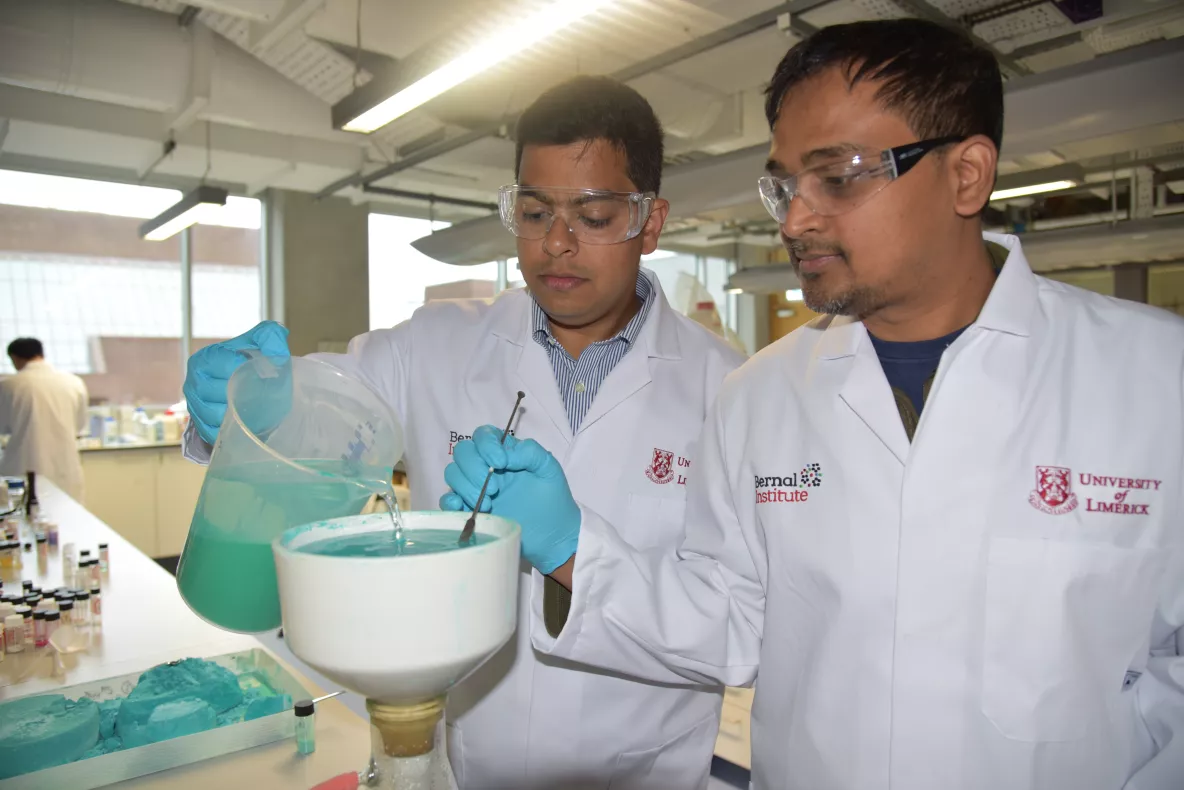
A revolutionary new material developed at University of Limerick could “help solve the global water crisis” by producing water from air, even in the most remote of locations.
Professor Michael Zaworotko, Bernal Chair of Crystal Engineering and Science Foundation of Ireland Research Professor at University of Limerick’s Bernal Institute, has developed the crystalline material after decades of research.
His lab discovered a material with favourable properties for absorbing and releasing water from the atmosphere that could revolutionise dehumidification systems in buildings and the availability of water in regions of drought.
It has been developed as a commercially viable nanomaterial by Molecule RND LTD, an international think tank, research group and incubator fund that has located in University of Limerick (UL) to work in collaboration with Prof Zaworotko.
In practice, the low energy desiccant – essentially a water capture material – could replace the silica traditionally used in dehumidification systems in buildings, explains Prof Zaworotko.
“Silica has been used for a long time as a desiccant to pull water from the atmosphere, but it is not very efficient,” he says. “If we replaced silica with this crystalline material, it would require substantially less energy to maintain air quality in buildings around the world.”
The material could also capture water from the atmosphere in arid regions, he adds.
“Even in zones of very low humidity on Earth, even in deserts, there is still some water in the atmosphere. This material could be applied to capture the water from the air, meaning you could potentially grow crops there.
“Without water, there is no life, no Plan B. About one third of the world’s population does not have access to pure water and this technology helps to solve that problem,” he adds.
Molecule say the technology could transform dehumidifiers into medical grade water generators that could solve the global city heat island effect and enable office buildings to produce their own water from air. The key feature of the new desiccant replacement material is that it operates exactly like the inorganic desiccants used today, but regenerates at 120°F instead of 400°F.
This drastically reduces the amount of energy used by existing dehumidifier equipment.
“We approached Mike to develop a material for us that could help solve the global water crisis,” says Kurt Francis, Molecule’s CTO. “Together, our teams meshed to bridge the gap between academic scientific research with real world product development, engineering and business development.
“Dehumidifiers are a surprisingly huge global industry and are found wherever air management is needed, in everything from office buildings to pharmaceuticals to dairy production.
“What’s been holding them back is that they’re inefficient due to the heat required to dry out the water vapour during the regeneration cycle. This technology solves that problem by simply replacing inorganic desiccants with our ROS-037 material used in desiccant rotors. As a result, you can curb your emissions and energy costs immediately.”
“To do this, we have discovered a sorbent that has improved the kinetics and energetics of water absorption/desorption by far over conventional desiccants,” explains Prof Zaworotko.
“This reduces the energy consumption of traditional dehumidifiers, enabling them to be transformed into water generating equipment, thus helping the global energy efficiency and water crises,” he adds.
Bjorn Simundson, Molecule’s CEO, adds: “We’re excited because this one material developed in collaboration with the University of Limerick unlocks a path to real commercial solutions globally.
“What I find amazing is that we seem to have found a way to transform normal HVAC equipment already on rooftops around the world to become a new source of incredibly clean water and curb their energy use at the same time. One simple change, a new revolutionary material to replace the old silica, has the capacity to transform global power consumption and provide a new source of pure water, even in dry climates.
“The low temperature and efficiency is the key, making even mobile or solar powered solutions possible. I dare say it looks like we have developed a truly revolutionary, global solution for humanity and the planet as we enter the 21st Century,” he adds.
Professor Luuk van der Wielen, director of the Bernal Institute at UL, said: “We are proud of Mike Zaworotko and his team. This is an exciting, game changing technology addressing multiple grand challenges around the theme of water handling which Molecule can bring to the developed and the developing world, potentially benefitting billions of people and the planet as a whole.”
Molecule already has orders for the first available commercial units, with a prototype water generator delivering water with low purity without any filtration.
Jon Hartley, retiring Board Chair, Vision Fund International, the micro finance subsidiary of World Vision, says the “breakthrough technology to enable potable water to be made more easily and quickly available in places of need around the world should save lives.
“The ability to generate pure water on demand from even low humidity air should be able to be used in both community development and humanitarian emergency circumstances,” he adds.
“The ultimate vision is to work together towards a common good,” says Frank Jao, Founder of Molecule.
“At Molecule and in collaboration with University of Limerick, we are just combining old-fashioned business ethics with modern technology to create solutions for the twenty first century. We believe in science serving humanity. It is our turn to give back. This is our legacy.”